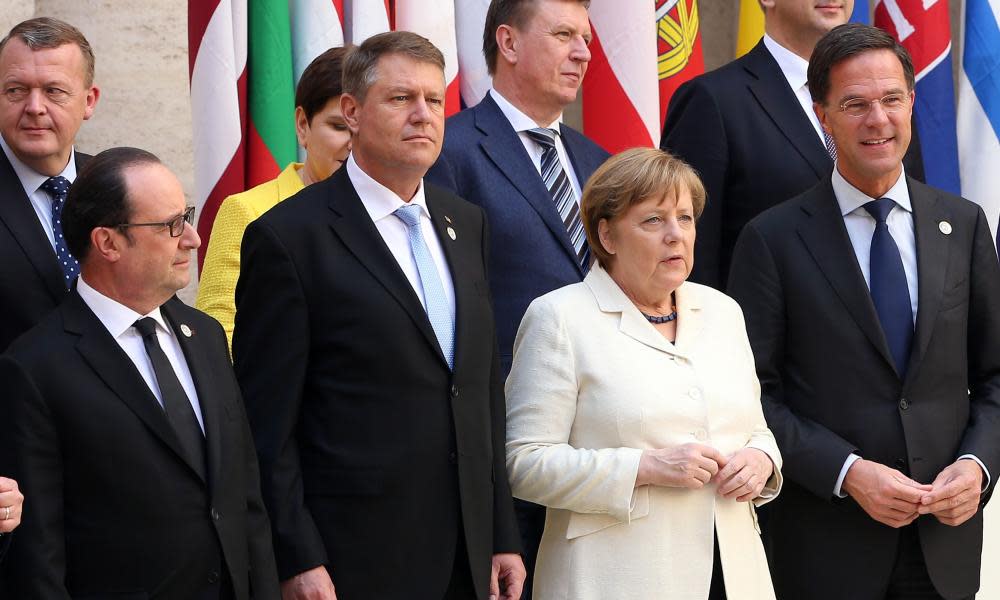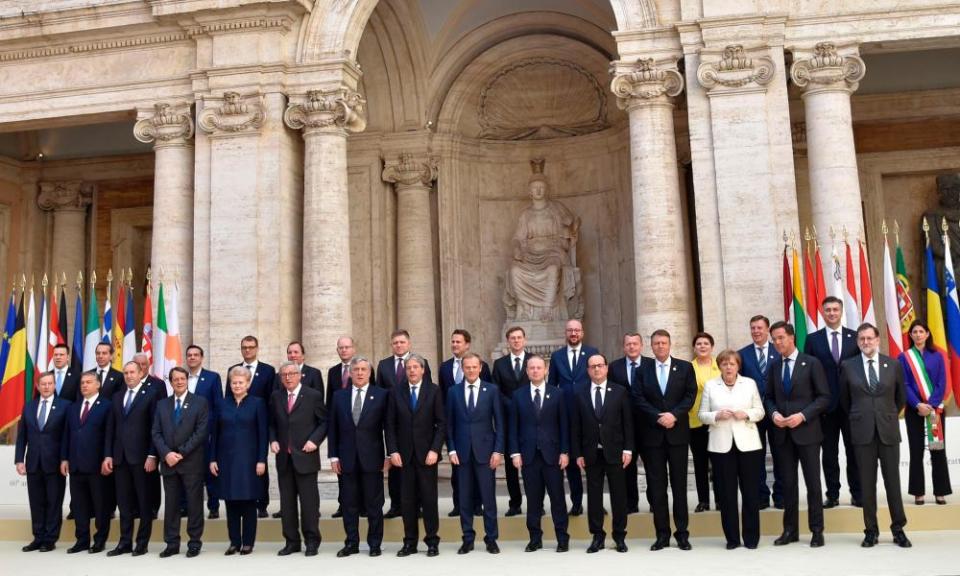European leaders gather to mark 60th anniversary of Treaty of Rome

Only once, and fleetingly, was the 28th member state of the European Union mentioned during the formalities of a distinctly sombre summit in Rome held to mark the 60th anniversary of the bloc. And it was not to celebrate what Boris Johnson has taken to describing as Britain’s liberation.
Lamenting the EU’s failure to respond adequately enough to the economic crisis of 2008, the Italian prime minister Paolo Gentolini told leaders and dignitaries: “That [failure] triggered in part of public opinion – unfortunately the majority of public opinion in the United Kingdom – it triggered a crisis of rejection. It brought forward the nationalism that we thought had been closed down in the archives.”
This was always billed by officials in Brussels as a low-key event; a moment to take stock, and to reflect on the fruits of cooperation, rather than pick at the inconveniences. And so it proved. Leaders of the 27 member states that will remain once the UK finally leaves in March 2019 arrived one by one at the Orazi and Curiazi Hall of the Capitol, in the Piazza del Campidogli, to a rather forbidding silence. Crowds had been kept at a distance, due to a wide security perimeter. Only a gaggle of cameramen sweating under a hot sun bore witness to their arrival at the hall, where 60 years ago crowds had braved a torrent of spring rain to watch on.
Once inside the hall, where representatives of six nations – France, the Netherlands, the Federal Republic of Germany, Luxembourg, Belgium and Italy – had signed in 1957 what was to become the Treaty of Rome, the speeches proved equally as solemn. Between short videos documenting how the EU had salvaged Europe from a tragic history of bloodshed, Gentolini, along with European commission president Jean-Claude Juncker, Donald Tusk, the president of the European Council, and the prime minister of Malta, Joseph Muscat, spoke of the debt owed to the founding fathers, and the importance of cooperation. “We – the humble heirs to these greats – are gathered once again in this very same room”, said Juncker.
“We do so to solemnly renew our vows and reaffirm our commitment to our undivided and indivisible union. But we do so not out of nostalgia. We do so because only by staying united can we rise to the challenges we can face together.
“Only by staying united can we pass on to future generations a more prosperous, a more social and a safer Europe.”

Tusk, from Gdańsk in Poland, noted that he too was 60 years old, and told a personal story. “In 1980, a year after the first elections to the European Parliament, in my Gdańsk, the Solidarity movement, Solidarność, was born,” he said.
“I was there at the time, in the Gdańsk shipyard, among the workers, together with Lech Wałęsa, who had the courage to shout out the truth about our dreams in the face of the communist regime. They were simple dreams: about human dignity, about freedom and democracy. At that time we all looked to the west, towards a free and unifying Europe, instinctively feeling that this was the very future we were dreaming about. And although tanks and troops were sent against us, those dreams lived on.”
It wasn’t said, of course, but on Wednesday Theresa May – who did not come to Rome – will send in her letter informing the EU institutions of the UK’s intention to exit the European Union, after 44 years of membership.
There had been talk of the Polish prime minister, Beata Szydło – whose country bears a grudge against her compatriot, Tusk – causing a stir today. A “Rome declaration” affirming the 27’s allegiance had been reworded to acknowledge the concerns of east European states about a proposed “multi-speed Europe”, in which some states cooperate more intensely than others. Greece, still in a grinding argument with the EU institutions about austerity, had also kicked up a mini-storm by demanding the inclusion of promises that the union would be more than a mere economic bloc, but would prioritise workers’ rights.
But on the day, Szydło did no more than provide a comic pause, lifting her pen in the air, before duly signing the document. The Greek prime minister, Alexis Tsipras, appeared to offer a little shrug as he put pen to paper.
The truth, José Barroso, the former European commission president, told the Observer, is that the EU is far more resilient than those who would destroy it give credit. “It moves, of course, incrementally and very much responding to crisis,” Barroso said.
“One of the founding fathers, Monnet, said the European community would respond to successive crises. Crisis helps focus peoples minds and to bring solutions. In general terms the view in Britain and America is that nothing works. It works. It works sometimes in a frustrating way because it is muddling through, time consuming and incremental but at the end it works. You have to think counterfactually: what would happen if it was not for the European union? The level of polarisation and antagonism [would] be much worse and we would have a very dysfunctional Europe.”
On the margins of the summit, the German chancellor, Angela Merkel, was asked about Brexit. “Some things are not for sale,” she told reporters, saying that Britain would not be granted any concessions which undermined the free movement of goods, people, services and capital within the European single market. Merkel added: “We are saying here very clearly that we want to go in a common direction.”

 Yahoo News
Yahoo News 
